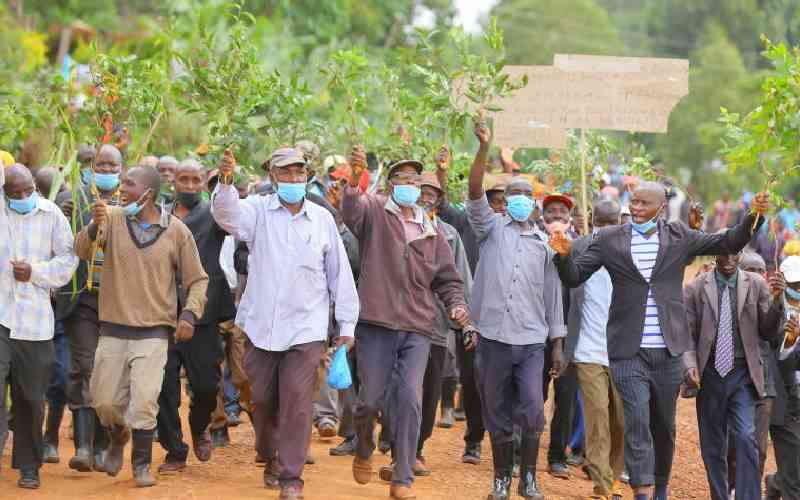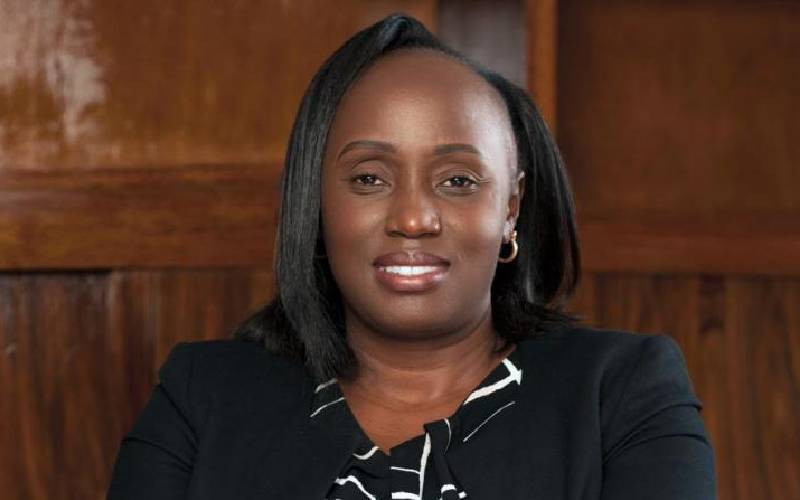By Peter Opiyo
Justice Aaron Ringera left the helm at Integrity Centre in a politically charged atmosphere.
On one hand, Parliament showed its might by turning down the President’s major reappointments, while on the other the Executive was crying foul over what it termed ‘a rogue legislature’.
The scene saw personality issues take centre stage, interestingly even among MPs who were clear that the necessary legal procedure was not followed in Ringera’s reappointment and that of his two assistants, Ms Fatuma Sichale and Dr Smokin Wanjala.
As Garsen MP Danson Mungatana aptly said, the issue was not about Ringera or the two assistant directors, but about respect to the rule of law.
 |
Former Kenya Anti-Corruption Commission Directer Justice Aaron Ringera. Pressure for his resignation forced him out of Integrity Centre following his reappointment by President Kibaki. Photo: Moses Omusula/Standard |
He argues that so long as the correct procedure is followed and the three end up at Kenya Anti-Corruption Commission again, there should be no big deal.And in giving their verdict, the joint parliamentary committees on Delegated Legislation and on Justice and Legal Affairs were categorical in their mandate that competence of KACC or its directors was beyond the boundaries of their roles. Theirs was clear: To check whether the necessary legal procedure was followed.
The two committees then turned a verdict that was later supported by the House, though amid protest from President Kibaki’s allies. So when Ringera finally bowed to pressure, Parliament’s might was evident, but even then, the retired justice shared his mind with the public.
Prosecutorial powers
It has been in the public knowledge that KACC is incapacitated in terms of prosecutorial powers, a scenario that has over time put Ringera and Attorney General Amos Wako at loggerheads.
Last week, Ringera outlined the necessary legal framework that would possibly give the anti-graft body ‘teeth to bite’. He cited four pieces of legislation to strengthen and underpin the anti-corruption struggle.
And Ikolomani MP Bonny Khalwale agrees that the legal framework of the anti-graft body should be re-looked to enhance its capacity.
Key among Ringera’s recommendations is the Legal Mutual Assistance law that would enable the Commission to obtain assistance from foreign countries to gather evidence to assist in criminal investigation or proceedings in another country. The law is pending before Parliament.
Also on Ringera’s list is the crucial Freedom of Information law that would repeal the Official Secrecy Act to allow access to Government information. Notably, Justice Philip Waki recommended this piece of legislation in his report on post-poll violence. The law, Waki argued, would help in accessing information regarding State and non-state actors of the violence. Efforts to enact this law have been frustrated by the Government since 2000.
Mr Job Ogonda, executive director of Transparency International-Kenya, underlines the importance of the Freedom of Information law, pointing out that as far as the law is absent, whistle blowing remains illegal and the Government continues to work in secrecy. Executive Director of Kituo Cha Sheria Priscilla Nyokabi, says the Freedom of Information law is a crucial legislation in fighting graft and enhancing development, noting it was regrettable Kenya was yet to enact the law even though it was a signatory to the UN Convention against corruption that requires that every country with an anti-corruption body must put in place the Freedom of Information law.
"Corruption thrives in secrecy and without access to information it is difficult to fight it. The public needs to know which cases are handled by the body and how they are handled," says Ms Nyokabi, who has been at the forefront advocating for the enactment of this law.
Role under focus
Other pieces of legislation proposed by Ringera are Witness Protection Act as well as Proceeds of Crime and Anti-Money Laundering law. The former has been enacted and is at the implementation stage, while the latter, which would help trace assets stashed abroad by suspects in mega scandals like Goldenberg and Anglo-leasing, is still pending before Parliament.
Dr Khalwale says the role of Parliament is now under serious focus as far as making the body more effective is concerned.
"The challenge is now on Parliament to have a re-look at the Anti-Corruption and Economic Crimes Act for purposes of making KACC effective. Parliament is central on this matter," says the MP.
He, however, points out that corrupt individuals within Government have been frustrating the passage of the Freedom of Information law and the Anti-Money Laundering and Proceeds of Crime Bill. But he optimistic the backbenchers will push the House Business Committee that sets the agenda of the House to prioritise them.
"With the new Standing Orders we would have a better opportunity to push for these things," says Khalwale, who is also the Chairman of Public Accounts Committee.
Out of the 22 members that sit in the House Business Committee, eight are backbenchers. Before the implementation of the new Standing Orders, HBC was an exclusive club of the executive.
In making the body efficient, joint government Chief Whip Jakoyo Midiwo says Parliament would seek to amend the Anti-corruption and Economic Crimes Act to compel KACC to submit quarterly progress reports on every case it is investigating.
His statement comes at a time Mungatana has published a Bill that would also repeal the Anti-corruption and Economic Crimes Act to give the body prosecutorial powers and place it under the AG’s office.
But Executive Director of Mars Group Mwalimu Mati disagrees, saying prosecutorial powers should rest with the AG’s office. He instead faults AG Amos Wako for failing to prosecute cases forwarded to him.
Mr Mati says the laws recommended by Ringera are crucial in the fight against graft, are listed in the UN Convention against corruption and should be enacted as a matter of urgency. But he faults the Witness Protection Act, arguing it only shields witnesses in courts. In this regard, Mati explains that Whistle Blower Act would be ideal.
"The Witness Protection Act is only restricted to the protection of witnesses in court; what we need is a Whistle Blowers Act to protect individuals in both the public and private sector," says Mati.
Ogonda agrees, saying the Whistle Blower Act is absolutely necessary in the fight against corruption. He further proposes that the prosecutorial powers be removed from the AG’s office and handed over to an independent body, to up the fight against corruption.
Ringera also called for the anchoring of KACC in the Constitution to shield it from court injunctions and ensure its independence.
"KACC should be anchored in the Constitution with necessary independence and powers. Such a move will adequately deal with many of the challenges the Commission encounters in court. It will also immunise the Commission against constant threats of disbandment and give its staff a sense of employment security," said Ringera in his resignation statement.
Corruption a crime
But Mati thinks otherwise, arguing corruption is a crime and there is no need to anchor KACC in the Constitution. Instead necessary legal order is required to ensure effective prosecution of cases.
Though Ringera’s recommendations are welcome, Mati says he had all the time to push for these laws, and that some of his proposals should be taken "with a pinch of salt".
Asked about the prospects of recovering billions of shillings lost in Anglo-leasing and Goldenberg scandals, Ringera was blunt: There are no hopes unless the Legal Mutual Assistance law is enacted.
But Ogonda disagrees, saying it was an open secret where accounts holding stashed money are.
"Even without the law, it is possible to trace the money. Serious Fraud Office in the UK has dedicated resources to trace the money, but it seems the Government is reluctant. Ringera is only right on the judicial aspect where under the international law the agreement is necessary for such assistance," argues Ogonda.
Though largely pointed out at the eleventh hour at the helm of KACC, Ringera’s recommendations are viewed as necessary in upping the war against corruption.
 The Standard Group Plc is a multi-media organization with investments in media
platforms spanning newspaper print operations, television, radio broadcasting,
digital and online services. The Standard Group is recognized as a leading
multi-media house in Kenya with a key influence in matters of national and
international interest.
The Standard Group Plc is a multi-media organization with investments in media
platforms spanning newspaper print operations, television, radio broadcasting,
digital and online services. The Standard Group is recognized as a leading
multi-media house in Kenya with a key influence in matters of national and
international interest.
 The Standard Group Plc is a multi-media organization with investments in media
platforms spanning newspaper print operations, television, radio broadcasting,
digital and online services. The Standard Group is recognized as a leading
multi-media house in Kenya with a key influence in matters of national and
international interest.
The Standard Group Plc is a multi-media organization with investments in media
platforms spanning newspaper print operations, television, radio broadcasting,
digital and online services. The Standard Group is recognized as a leading
multi-media house in Kenya with a key influence in matters of national and
international interest.










